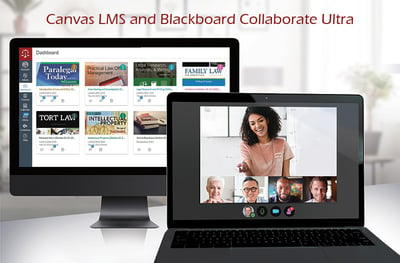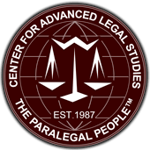Skepticism. Acceptance. Preference. Necessity.
The advancement of distance education at Center for Advanced Legal Studies
Over the past 15 years, we have witnessed the rise of distance education and its progression from being viewed with skepticism to acceptance, from acceptance to preference, and now, from preference to necessity. In 2006, no one at Center for Advanced Legal Studies (CALS) imagined that in little more than a decade we would go from having a few hundred campus-based paralegal students, with none online, to having no campus-based students and over two hundred online.
 Unlike many educational institutions who scrambled to implement virtual learning as a result of COVID-19 restrictions, CALS was able to migrate all its campus-based students to online delivery in less than a weekend. It helped that by March 2020 five out of six students at CALS were already taking their classes online. The skepticism many previously felt regarding online classes had long since shifted to a strong preference for them, and those who selected campus-based classes chose them more as a matter of personal preference and convenience than from any concern over the effectiveness of distance learning. We miss being on campus and seeing our students, and we know they feel the same, but we continue to successfully educate and train students to become paralegals, just as we have since 1987.
Unlike many educational institutions who scrambled to implement virtual learning as a result of COVID-19 restrictions, CALS was able to migrate all its campus-based students to online delivery in less than a weekend. It helped that by March 2020 five out of six students at CALS were already taking their classes online. The skepticism many previously felt regarding online classes had long since shifted to a strong preference for them, and those who selected campus-based classes chose them more as a matter of personal preference and convenience than from any concern over the effectiveness of distance learning. We miss being on campus and seeing our students, and we know they feel the same, but we continue to successfully educate and train students to become paralegals, just as we have since 1987.
This is different! Who moved my cheese!?!
In 2006, students at CALS had two options on how to attend: morning or evening classes. Morning classes met Monday through Thursday from 8 AM to noon, and evening classes met Monday, Tuesday, and Thursday evenings from 6 to 10 PM. Both schedules were demanding, but the evening schedule especially so. Houston traffic notwithstanding, attending class until 10 o’clock at night required a remarkable amount of grit and determination. Kudos to all those who prevailed. You impress us still. Would anyone do that now?
CALS had been approved that same year to offer instruction in a blended, or hybrid format. This meant evening students, after completing their first 4 courses attending three nights per week, could attend live class on campus just one night per week thereafter, and complete the remainder of their work asynchronously when convenient for them using the learning management system WebCT. It looked like a sure winner, and CALS made the decision to enroll new evening students exclusively under the blended learning format, and to offer this option to current students as well.
Then came the pushback. Many current students were wary of the format change and wanted to continue having live class three nights per week. What?
This was an unexpected response, but CALS stuck by its decision to have mandatory live class just one night per week, as scheduled, and the instructor would hold optional classes and expanded lectures on the other days, as was done before. It came as no surprise when not a single student attended the optional lectures, even those who were the most vocal about wanting them. Attending live class one night per week and doing the rest of the work on their own time was pretty nice after all. In a matter of weeks, students grew to love the new way of attending classes and having a little more time at home. Soon, this new format became the standard for all evening classes.
Thank you, Internet. Thank you, iPhone.
Learning at a distance has been around for decades, but only recently has it become the rich, interactive experience students expect. CALS waited until synchronous live classroom technology had matured into proven, stable platforms before offering 100% online classes. Students needed to interact live with their instructors and classmates, and to see and hear them, with no limits to the teaching and learning experience. By 2009, evening classes had proven that 2 hours of live lecture per class each week was sufficient to cover all essential topics. Students were doing well completing the asynchronous activities on their own. Learning outcomes and employment numbers remained high. High speed Internet was widely available. It was time to move completely online.
CALS adopted a platform called Horizon Wimba for its live classes. Perhaps a funny name, but Wimba allowed students and instructors to meet live online and it supported audio, video, whiteboards, application sharing, breakout rooms, polling questions, and many other key features. On July 27, 2009 Center for Advanced Legal Studies started its first group of 6 students taking paralegal classes 100% online. Exactly eleven years later, on July 27, 2020, CALS started 60 new online paralegal students.
There is no question that none of this would be achievable without the Internet. It is also likely that the universal appeal of smartphones, like Apple’s iPhone, has helped create a sense of comfort and familiarity with technology that had never existed before. Questions regarding ‘how?’ became ‘why not?’ and as technology gets better, even greater advancements are possible.
What are online paralegal classes at CALS like today?
Students attending Center for Advanced Legal Studies are afforded access to many leading teaching and learning platforms. CALS utilizes Canvas LMS for its learning management system. Canvas is in use by more than 4,000 institutions globally and is the preferred LMS of many top tier universities. In Canvas, students can access their courses, receive course announcements, view weekly course content, watch videos and prerecorded lectures, participate in class discussion questions, submit their assignments, take tests and quizzes, and see their grades with instructor feedback. These activities they do on their own time asynchronously when its most convenient for them.
 Live classes are presented via Blackboard Collaborate Ultra. Unlike repurposed business meeting software, Collaborate was designed from the ground up for education. Collaborate allows instructors and students to see and hear each other during live classes, view the whiteboard and PowerPoint presentations, participate in breakout room activities, and follow along with their instructor through application sharing to edit and review legal documents. While it is recommended to join live classes with a laptop or desktop for best experience, students can also attend live classes on their smartphone or tablet when necessary. All that is needed is a good, reliable, Internet connection.
Live classes are presented via Blackboard Collaborate Ultra. Unlike repurposed business meeting software, Collaborate was designed from the ground up for education. Collaborate allows instructors and students to see and hear each other during live classes, view the whiteboard and PowerPoint presentations, participate in breakout room activities, and follow along with their instructor through application sharing to edit and review legal documents. While it is recommended to join live classes with a laptop or desktop for best experience, students can also attend live classes on their smartphone or tablet when necessary. All that is needed is a good, reliable, Internet connection.
To combat the ever-increasing cost of textbooks and provide more convenient access to learning materials, all students at CALS are issued Cengage Unlimited accounts and have access to nearly all textbooks electronically. Students can access their textbooks immediately on their laptop or desktop computer, or on their phone or tablet. Through Cengage Unlimited students can elect to rent their textbooks for just $7.99 each, or even purchase them if desired. The choice is theirs.
All students at CALS are issued Microsoft 365 and @paralegal.edu email accounts. Students can install Microsoft Office applications such as Word, Excel, PowerPoint, and Outlook on up to five computers or devices while active in their program. After graduation, alumni keep their Microsoft 365 accounts with access to web versions of Office applications along with their professional @paralegal.edu email address.
For conducting electronic legal research, students at CALS have access to Fastcase, which provides simplified access to primary authority and a less intimidating research experience for new users. After their first two classes, all Paralegal Certificate students are issued Westlaw accounts for the remainder of their program. Many consider Westlaw to be the industry standard in electronic legal research.
As students progress through their studies, they are also introduced to ProDoc, Clio, CaseMap, TimeMap, and Trial Director. It takes a lot of practice to master these software titles, but the first step for many in becoming familiar with them happens at CALS.
Is Online Education the new normal?
Like you, all of us at Center for Advanced Legal Studies desire for things to return to normal as quickly as possible. We look forward to students enrolling to attend on campus classes soon. Many students choose CALS for their paralegal education and training because of our ability to provide both morning and Saturday campus classes and 100% online options.
Online paralegal classes are interactive, engaging, and equivalent in almost every way to the outcomes realized in traditional classroom settings. When online courses were first being developed at CALS, we applied our 20 plus years’ experience in campus based paralegal education to inform decisions on how to best present paralegal classes online. When on campus classes resume, we are confident they will benefit from the experience of being completely online — and will be all the better for it.
If you are considering enrolling in a paralegal program, to either begin or advance your paralegal career, be assured that online opportunities are widely available and effective. Contact Center for Advanced Legal Studies if you would like to know more about our experience with distance education and what to expect from an effective and engaging virtual environment.
 |
Eric H. Happe is Director of Distance Education at |
This article and others relating to paralegals and the paralegal profession will appear in the next issue of the Paralegals Connect Newsletter available at http://www.paralegalsconnect.com/newsletter.html
Join the Paralegals Connect Facebook Group at https://www.facebook.com/groups/ParalegalsConnect/












